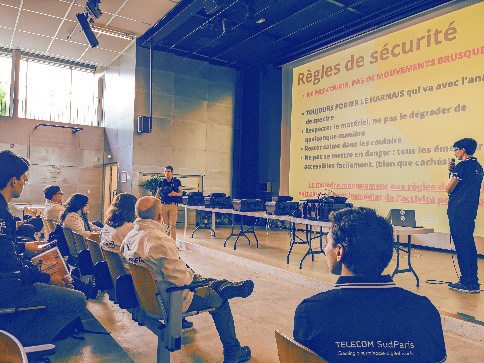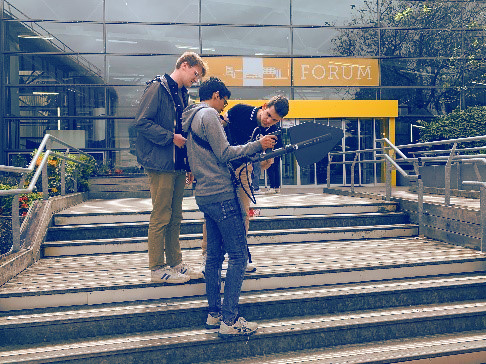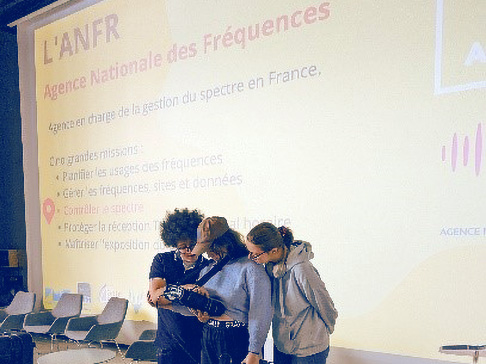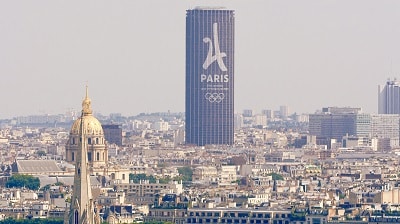2024 Olympic and Paralympic Games: Telecom SudParis and ANFR join forces to improve frequency control
Publié le February 12 2024As Paris prepares to host the 2024 Olympic and Paralympic Games, one crucial issue is electromagnetic frequency control. With 15 competition venues located within 5 kilometers of each other, the high risk of frequency interference poses a problem. How can the city ensure this major event runs smoothly under such conditions? France’s National Frequency Agency (ANFR) has therefore partnered with Telecom SudParis to train 70 student engineers in frequency control, creating a promising partnership to meet this major challenge.
The challenge of the 2024 Olympic Games
The French National Frequency Agency (ANFR) is responsible for scheduling, managing and controlling the use of electromagnetic frequencies in France, and plays a key role as the country’s electromagnetic frequency regulator. ANFR usually deploys around eighty spectrum controllers, spread throughout mainland France and the French overseas territories, to prevent and remedy interference for spectrum users such as civil aviation, Météo France and cell phone operators.
They also provide assistance with the organization and coverage of major events such as the French Open at Roland Garros, the 24 Hours of Le Mans, the Tour de France, and the July 14th celebrations. Their role is to ensure that the radio frequencies needed for communications, for example between the radio, cameras and production teams, are in good working order.
For the 2024 Olympic and Paralympic Games in Paris, which will be held simultaneously at multiple venues, ANFR will need a considerable amount of spectrum regulators given the massive use of different frequencies at the same time and location. ANFR will be able to fill some of this need by partnering with its foreign counterparts.
To ensure the success of this event bringing together more than 10,000 transmitters, ANFR and Telecom SudParis are training 70 engineering students in spectrum and frequency control by providing them with first-year or second-year internships, which can lead to permanent jobs.
Enzo Simonneau, a second-year engineering student at Telecom SudParis, highlights the magnitude of the challenge: “The public wants to watch the games on television, which will require extensive broadcasting coverage. With nearly 50,000 media accreditations concentrated within a five-kilometer radius, the demand for Internet access for the rebroadcasting of the event will be considerable. It will therefore be important to avoid any interference.”
Cooperation inspired by GATE projects
One year ago, ANFR offered to develop a program at Telecom SudParis to train engineering students in spectrum control with the aim of strengthening its teams at the various venues of the Olympic Games.
As a result, nine first-year engineering students embarked on the adventure of co-designing this program at the start of the 2022 academic year as part of the GATE educational project (French acronym for Management and Learning Teamwork). During this long-term project, students had to define the training need and the training protocol schedule with the aim of expanding this program to include more engineering students in 2023-2024.
The faculty members and team of students adapted the program to fit the school’s existing educational program while ensuring that the proposed specifications met ANFR’s needs.
The spectrum control program takes place in four stages:
- Theoretical training provided by Telecom SudParis, including the study of frequencies and microwaves, courses which are generally taught in the third-year “Embedded Systems, Mobility and Communicating Objects (SEM)” specialization track.
- Theoretical training provided by ANFR, applied to its specific context.
- Applied training with an introduction to the equipment and protocol.
- And finally, the last stage takes place on the ground, during a real-life event.
On May 11, 2023, engineering students from Telecom SudParis and Telecom Paris set out on a “fox hunt” aimed at clearing 20 scramblers scattered throughout the Evry campus by a team of students from the GATE “CERF” project. This was the perfect opportunity for the French National Frequency Agency to raise awareness among all students on the issues of spectrum control as it prepares for the Paris 2024 Olympic Games.



Recruitment and coordination challenges
The first team of engineering students from Telecom SudParis to be trained has already completed an internship covering Roland Garros, the Tour de France, preparations for the Bastille Day parade, and the Rugby World Cup.
The recruitment of new student volunteers began with the start of the 2023 academic year. They will soon start their training in early October. By the end of their fall break from late October to early November, the volunteer students from Telecom SudParis, Telecom Paris and ESPCI Paris PSL will have completed the school’s theoretical training and will start ANFR’s training. Second-year students are also welcome to apply.
All volunteers who have successfully completed the training will be issued an ANFR certificate and offered an internship or a fixed-term student employment contract for the Olympic Games to control the spectrum.
